Duiker W.J., Spielvogel J.J. The Essential World History. Volume 2: Since 1500
Подождите немного. Документ загружается.


rhetoric, if not all of the harsh practices, of the Cold War.
President Reagan’s anti-Communist credentials were well
known. In a speech given shortly after his election in
1980, he referred to the Soviet Union as an ‘‘evil empire’’
and frequently voiced his suspicion of Soviet motives in
foreign affairs. In an effort to eliminate perceived Soviet
advantages in strategic weaponry, the White House began
a military buildup that stimulated a renewed arms race.
In 1982, the Reagan administration introduced the nu-
clear-tipped cruise missile, whose ability to fly at low
altitudes made it difficult to detect by enemy radar.
Reagan also became an ardent exponent of the Strategic
Defense Initiative (SDI), nicknamed ‘‘Star Wars.’’ The
intent behind this proposed defense system was not only
to create a space shield that could destroy incoming
missiles but also to force Moscow into an arms race that it
could not hope to win.
The Reagan administration also adopted a more ac-
tivist, if not confrontational, stance in the Third World.
That attitude was most directly dem-
onstrated in Central America, where the
revolutionary Sandinista regime had
been established in Nicaragua after the
overthrow of the Somoza dictatorship
in 1979. Charging that the Sandinista
regime was supporting a guerrilla in-
surgency movement in nearby El Sal-
vador, the Reagan administration began
to provide material aid to the govern-
ment in El Salvador while simulta-
neously supporting an anti-Communist
guerrilla movement (the Contras)in
Nicaragua. Though the administration
insisted that it was countering the
spread of communism in the Western Hemisphere, its
Central American policy aroused considerable controversy
in Congress, where some members charged that growing
U.S. involvement could lead to a repeat of the nation’s
bitter experience in Vietnam.
The Reagan administration also took the offensive in
other areas. By providing military support to the anti-
Soviet insurgents in Afghanistan, the White House helped
maintain a Vietnam-like war in Afghanistan that en-
tangled the Soviet Union in its own quagmire. Like the
Vietnam War, the conflict in Afghanistan resulted in
heavy casualties and demonstrated that the influence of a
superpower was limited in the face of strong nationalist,
guerrilla-type opposition.
Toward a New World Order
In 1985, Mikhail Gor bachev was elected secretary of
the Communist Party of the Soviet Union. During
Bre zhnev’s last years and the b rief tenures of his two
successors ( see Chapter 27) , the Sov iet Union ha d en-
tered an era of serious economic decline, and the dy-
namic new party chief was well aware that drastic
changes would be needed to rekindle the dreams that
had inspired the Bolshev ik Revolution. During the next
few years, he launched a program of restructuring
(perestroika) to revitalize the Soviet system. As par t of
th at p rogram, he set out to improve relations with the
United S tat es and the rest of the capitalist world. When
he met with President Reagan in Reykjavik, the capital
of Iceland, the two leaders agreed to set aside their
ideological differences.
Gorbachev’s desperate effort to rescue the Soviet U n-
ion from collapse was too little and too late. As 1991 drew
to a close, the Soviet Union, so long an apparently per-
manent fixture on the global scene, suddenly disintegrated;
in its place arose fifteen new nations. That same year, the
string of Soviet satellites in Eastern Europe broke loose
from Moscow’s grip and declared their
independence from Communist rule.
The Cold War was over.
The end of the Cold War lulled
many observers into the seductive
vision of a new world order that
would be characterized by peaceful
cooperation and increasing prosper-
ity. Sadly, such hopes have not been
realized (see the comparative essay
‘‘Global Village or Clash of Civi-
lizations?’’ on p. 667). A bitter civil
war in the Balkans in the mid-1990s
graphically demonstrated that old
fault lines of national and ethnic
hostility still divided the post--Cold War world. Else-
where, bloody ethnic and religious disputes broke out
in Africa and the Middle East. Then, on September 11,
2001, the world entered a dangerous new era when
terrorists attacked the nerve centers of U.S. power in
New York City and Washington, D.C., inaugurating a
new round of tension between the West and the forces
of militant Islam. These events will be discussed in
greater detail in the chapters that follow.
In the meantime, other issues beyond the headlines
clamor for attention. Environmental problems and the
threat of global warming , the growing gap between rich
and poor nations, and tensions caused by migrations
of peoples all present a growing threat to political
stability and the pursuit of happiness. As the twenty-
first century progresses, the task of guaranteeing the
survival of the human race appears to be just as chal-
lenging, and even more complex, than it was during
the Cold War.
MEXICO
EL
SALVADOR
NICARAGUA
COSTA RICA
HONDURAS
BELIZE
Pacific
Ocean
Caribbean Sea
G
U
A
T
E
M
A
L
A
200 Miles
300 Kilometers0
0
Northern Central America
666 CHAPTER 26 EAST AND WEST IN THE GRIP OF THE COLD WAR
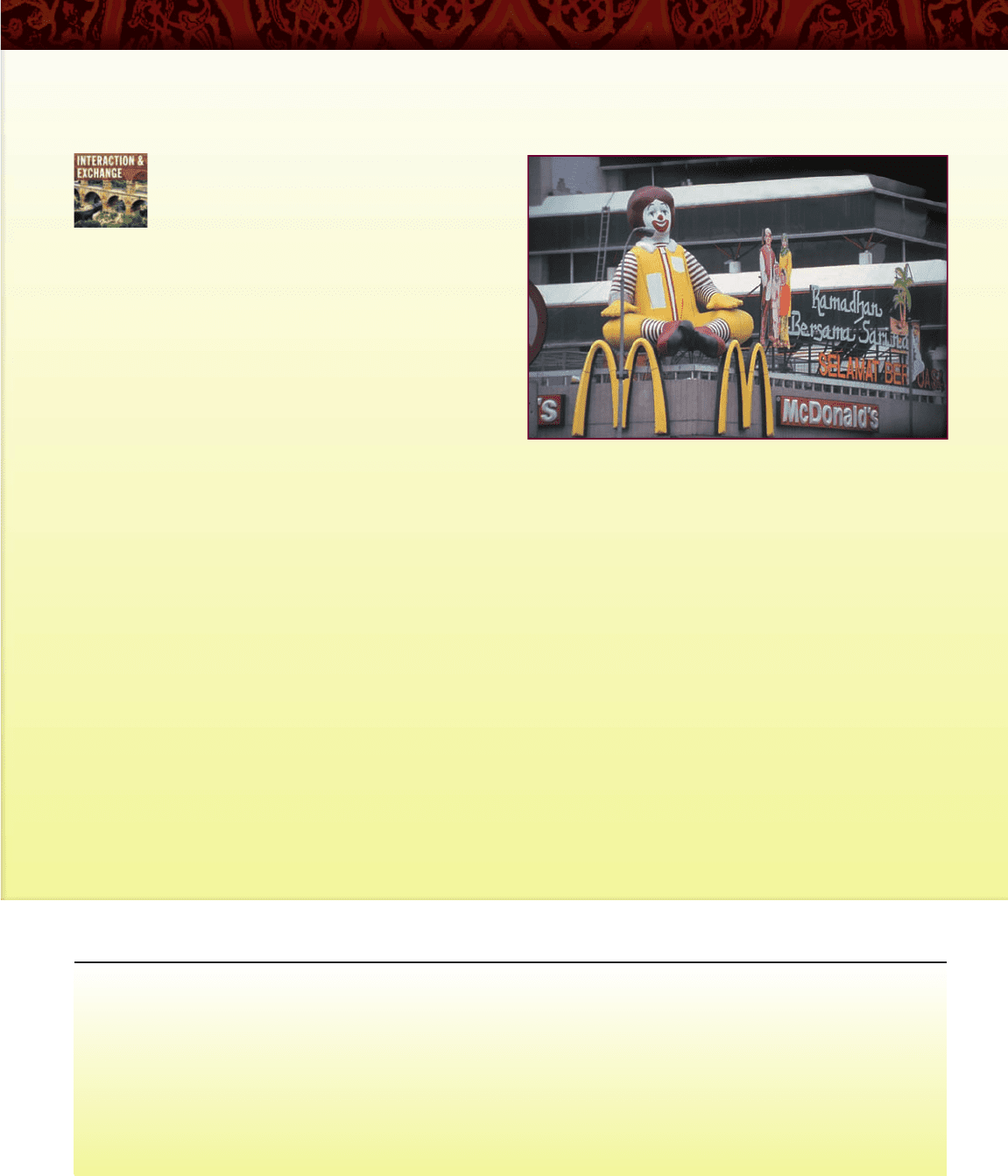
COMPARATIVE ESSAY
G
LOBAL VILLAGE OR CLASH OF CIVILIZATIONS?
As the Cold War came to an end in 1991, states-
men, scholars, and political pundits began to fore-
cast the emergence of a ‘‘new world order.’’ One
hypothesis was that the decline of communism sig-
naled that the industrial capitalist democracies of the West had
triumphed in the world of ideas and were now poised to remake
the rest of the world in their own image.
Not all agreed with this optimistic view of the world situation. In
The Clash of Civilizations and the Remaking of the World Order , the
historian Samuel P. Huntington suggested that the post--Cold War era,
far from marking the triumph of Western ideals, would be character-
ized by increased global fragmentation and a ‘‘clash of civilizations’’
based on ethnic, cultural, or religious differences. According to H un-
tington, the twenty-first century would be dominated by disputatious
cultural blocs in East Asia, Western Europe and the United States,
Eurasia, and the Middle East. The dream of a universal order---a global
village---dominated by Western values, he concluded, is a fantasy.
Recent events have lent some support to Huntington’s hypothe-
sis. The collapse of the Soviet Union led to the emergence of an at-
mosphere of conflict and tension all along the perimeter of the old
Soviet Empire. More recently, the terrorist attack on the United
States in September 2001 set the advanced nations of the West and
much of the Muslim world on a collision course. As for the new
economic order---now enshrined as official policy in Western
capitals---public anger at the impact of globalization and the recent
worldwide financial crisis has reached disturbing levels in many
countries, leading to a growing demand for self-protection and
group identity in an impersonal and rapidly changing world.
Are we then headed toward Huntington’s prediction of multiple
power blocs divided by religion and culture? His thesis is indeed a
useful corrective to the complacent tendency of many observers to
view Western civilization as the zenith of human achievement. On the
other hand, by dividing the world into competing cultural blocs,
Huntington has underestimated the centrifugal forces at work in the
various regions of the world. As the industrial and technological revo-
lutions spread across the face of the earth, their impact is measurably
stronger in some societies than in others, thus intensifying historical
rivalries in a given region while establishing links between individual
societies and counterparts in other parts of the world. In recent years,
for example, Japan has had more in common with the United States
than with its traditional neighbors, China and Korea.
The most likely scenario for the next few decades, then, is more
complex than either the global village hypothesis or its rival, the clash
of civilizations. The twenty-first century will be characterized by si-
multaneous trends toward globalization and fragmentation as the
thrust of technology and information transforms societies and gives
rise to counterreactions among societies seeking to preserve a group
identity and sense of meaning and purpose in a confusing world.
Q
In the next decade, do you believe that the forces of
globalization or of fragmentation will be the stronger?
Ronald McDonald in Indonesia. This giant statue welcomes young
Indonesians to a McDonald’s restaurant in Jakarta, the capital city. McDonald’s
food chain symbolizes the globalization of today’s world civilization.
CONCLUSION
AT THE END OF WORLD WAR II, a new conflict appeared in
Eur ope as the two superpowers, the United States and the Soviet Union,
began to compete for political domination. This ideological division soon
spread to the rest of the world as the United States fought in Korea and
Vietnam to prevent the spread of communism, promoted by the new
Maoist government in China, while the Soviet U nion used its influence to
prop up pro-Soviet regimes in Asia, Africa, and Latin America.
What had begun, then, as a confrontation across the great divide
of the ‘‘iron curtain’’ in Europe eventually took on global significance,
much as the major European powers had jostled for position and
advantage in Africa and eastern Asia prior to World War I. As a result,
both Mosco w and Washington became entangled in areas that in
themselves had little importance in terms of real national security
interests.
As the twentieth century entered its last two decades, however,
there were tantalizing signs of a thaw in the Cold War. In 1979,
China and the United States decided to establish mutual diplomatic
relations, a consequence of Beijing’s decision to focus on domestic
CONCLUSION 667
c
William J. Duiker
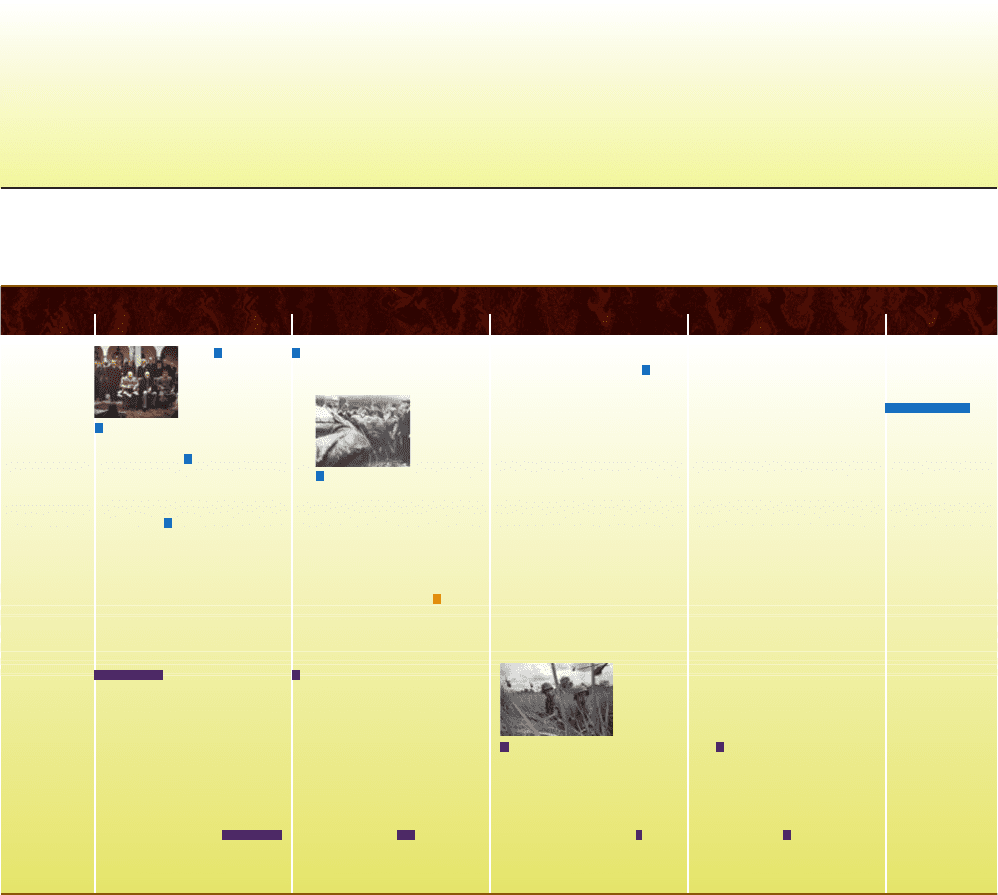
SUGGESTED READING
Cold War Literature on the Cold War is abundant. Two
general accounts are R. B. Levering, The Cold War, 1945--1972
(Arlington Heights, Ill., 1982), and B. A. Weisberger, Cold War,
Cold Peace: The United States and Russia Since 1945 (New York,
1984). Two works that maintain that the Soviet Union was chiefly
responsible for the Cold War are H. Feis, From Trust to Terror: The
Onset of the Cold War, 1945--1950 (New York, 1970), and A. Ulam,
The Rivals: America and Russia Since World War II (New York,
1971). Revisionist studies on the Cold War have emphasized U.S.
responsibility for the Cold War, especially its global aspects. These
works include J. Kolko and G. Kolko, The Limits of Power: The
World and United States Foreign Policy, 1945--1954 (New York,
1972); W. La Feber, America, Russia, and the Cold War, 1945--
1966, 8th ed. (New York, 2002); and M. Sherwin, A World
Destroyed: The Atomic Bomb and the Grand Alliance (New York,
1975). For a highly competent retrospective analysis of the Cold War
era, see J. L. Gaddis, We Now Know: Rethinking Cold War Histor y
(Oxford, 1997). Also see his more general work The Cold War: A
New History (New York, 2005). For the perspective of a veteran
journalist, see M. Frankel, High Noon in the Cold War: Kennedy,
Khrushchev, and the Cuban Missile Crisis (New York, 2004).
A number of studies of the early stages of the Cold War have
been based on documents unavailable until the late 1980s or early
1990s. See, for example, O. A. Westad, Cold War and Revolution:
Soviet-American Rivalry and the Origins of the Chinese Civil War
reform and stop supporting wars of national liberation in Asia. Six
years later, the ascent of Mikhail Gorbachev to leadership in the
Soviet Union, culminating in the collapse of the Soviet Union in
1991, brought a final end to almost half a century of bitter rivalry
between the world’s two superpowers.
The Cold War thus ended without the horrifying vision of a
mushroom cloud. Unlik e the earlier rivalries that had resulted in two
world wars, this time the antagonists had gradually come to realize
that the struggle for supremacy could be carried out in the political
and economic arena rather than on the battlefield. And in the final
analysis, it was not military superiority, but political, economic, and
cultural factors that brought about the triumph of Western civilization
over the Marxist vision of a classless utopia. The world’ s statesmen
could now shift their focus to other problems of mutual concern.
TIMELINE
1945
1955 1965 1975 1985
Europe
Central
America
Asia
Yalta
Conference
Tito expelled from
Soviet bloc
Civil war in China Geneva Conference
ends conflict in Indochina
Communists seize
power in South Vietnam
United States sends
combat troops to
Vietnam
Sino-Soviet dispute begins Nixon visit to China
Marshall Plan
NATO
formed
Warsaw Pact created
Cuban Missile Crisis
SALT I pact signed
Perestroika
launched in
Soviet Union
Soviet invasion
of Afghanistan
Hungarian Revolution
Korean War
668 CHAPTER 26 EAST AND WEST IN THE GRIP OF THE COLD WAR
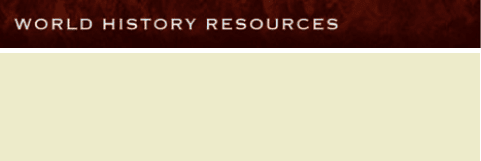
(New York, 1993); D. A. Mayers, Cracking the Monolith: U.S.
Policy Against the Sino-Soviet Alliance, 1949--1955 (Baton Rouge,
La., 1986); and Chen Jian, China’s Road to the Korean War: The
Making of the Sino-American Confrontation (New York, 1994). S.
Goncharov, J. W. Lewis, and Xue Litai, Uncertain Partners: Stalin,
Mao, and the Korean War (Stanford, Calif., 1993), provides a
fascinating view of the war from several perspectives.
For important studies of Soviet foreign policy, see A. B. Ulam,
Dangerous Relations: The Soviet Union in World Politics, 1970--1982
(New York, 1983). The effects of the Cold War on Germany are
examined in J. H. Backer , The Decision to Divide Germany: American
For eign Policy in Transition (Durham, N.C., 1978). On atomic
diplomacy in the Cold War , see G. F. Herken, The Winning Weapon:
The Atomic Bomb in the Cold War , 1945--1950 (New York, 1981). For
a good introduction to the arms race, see E. M. Bottome, The Balance
of Terror: A Guide to the A rms Race, rev . ed. (Boston, 1986).
China There are several informative surveys of Chinese foreign
policy since the Communist rise to power. A particularly insightful
account is Chen Jian, Mao’s China and the Cold War (Chapel Hill,
N.C., 2001). On Sino-U.S. relations, see H. Harding, A Fragile
Relationship: The United States and China Since 1972 (Washington,
D .C., 1992), and W. Burr, ed., The Kissinger Transcripts: The Top-
Secret Talks with Beijing and Moscow (New York, 1998). On Chinese
policy in Korea, see Shu Guang Zhang, Mao’s Military Romanticism:
China and the Korean War (Lawrence, Kans., 2001), and Xiaobing
Li et al., Mao’s Generals Remember Korea (Lawrence, Kans., 2001).
On Sino-Vietnamese relations, see Ang Cheng Guan, Vietnamese
Communists’ Relations with China and the Second Indochina
Conflict (Jefferson, N.C., 1997).
Visit the website for The Essential World History to access study
aids such as Flashcards, Critical Thinking Exercises, and
Chapter Quizzes:
www.cengage.com/history/duikspiel/essentialworld6e
CONCLUSION 669
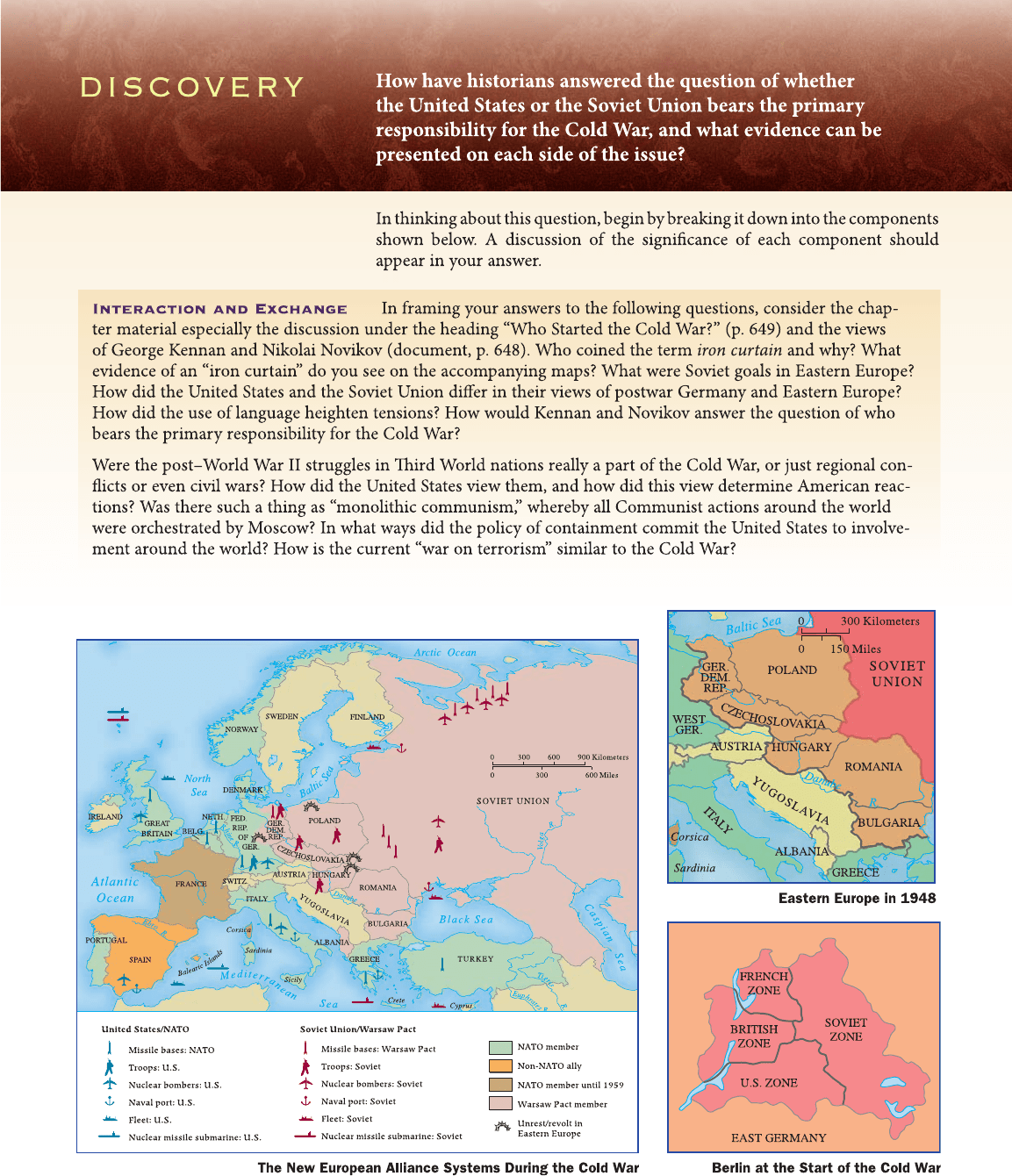
670
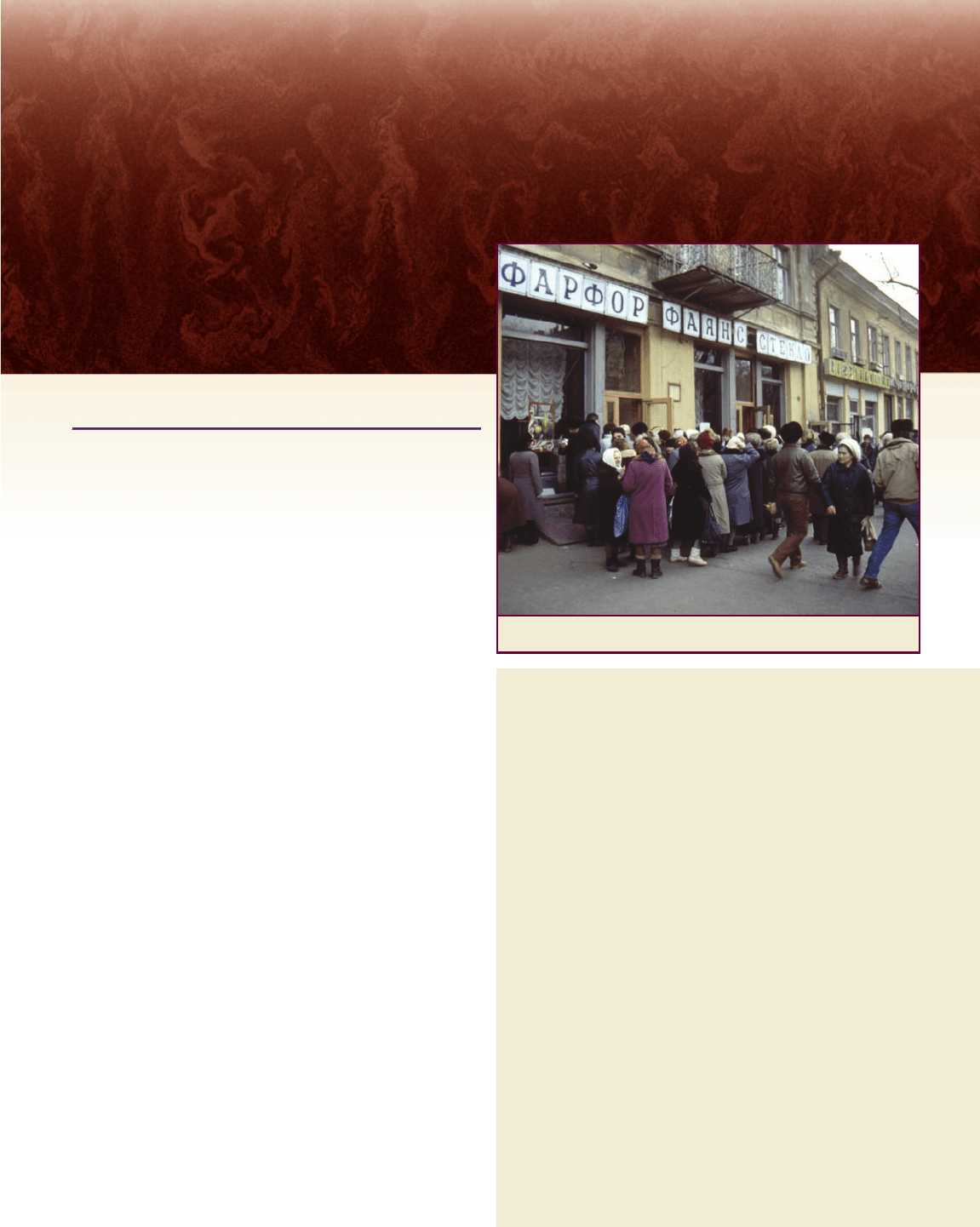
CHAPTER 27
BRAVE NEW WORLD: COMMUNISM ON TRIAL
CHAPTER OUTLINE
AND FOCUS QUESTIONS
The Postwar Soviet Union
Q
How did Nikita Khrushchev change the system that
the Soviet dictator Joseph Stalin had put in place before
his death in 1953? To what degree did his successors
continue Khrushchev’s policies?
The Disintegration of the Soviet Empire
Q
What were the key components of perestroika, which
Mikhail Gorbachev espoused during the 1980s? Why
were they unsuccessful in preventing the collapse of the
Soviet Union?
The East Is Red: China Under Communism
Q
What were Mao Zedong’s chief goals for China, and
what policies did he institute to try to achieve them?
‘‘Serve the People’’: Chinese Society
Under Communism
Q
What significant political, economic, and social changes
have taken place in China since the death of Mao
Zedong? Have they been successful?
CRITICAL THINKING
Q
Why has communism survived in China when it failed
in Eastern Europe and Russia? Compare conditions in
China today with those in countries elsewhere in the
world that have abandoned the Communist system.
Are Chinese leaders justified in claiming that without
party leadership, the country would fall into chaos?
Shopping in Moscow
ACCORDING TO KARL MARX, capitalism is a system that
involves the exploitation of man by man; under socialism, it is the
other way around. That wry joke was typical of popular humor in
post--World War II Moscow, where the dreams of a future utopia
had faded in the grim reality of life in the Soviet Union.
For the average Soviet citizen after World War II, few images
better symbolized the shortcomings of the Soviet system than a long
line of people queuing up outside an official state store selling con-
sumer goods. Because the command economy was so inefficient,
items of daily use were chronically in such short supply that when a
particular item became available, people often lined up immediately
to buy several for themselves and their friends. Sometimes, when
people saw a line forming, they would automatically join the queue
without even knowing what item was available for purchase!
Despite the evident weaknesses of the centralized Soviet econ-
omy, the Communist monopoly on power seemed secure, as did
Moscow’s hold over its client states in Eastern Europe. In fact, for
three decades after the end of World War II, the Soviet Empire
appeared to be a permanent feature of the international landscape.
But by the early 1980s, it was clear that there were cracks in the
Kremlin wall. The Soviet economy was stagnant, the minority
nationalities were restive, and Eastern European leaders were
671
c
William J. Duiker
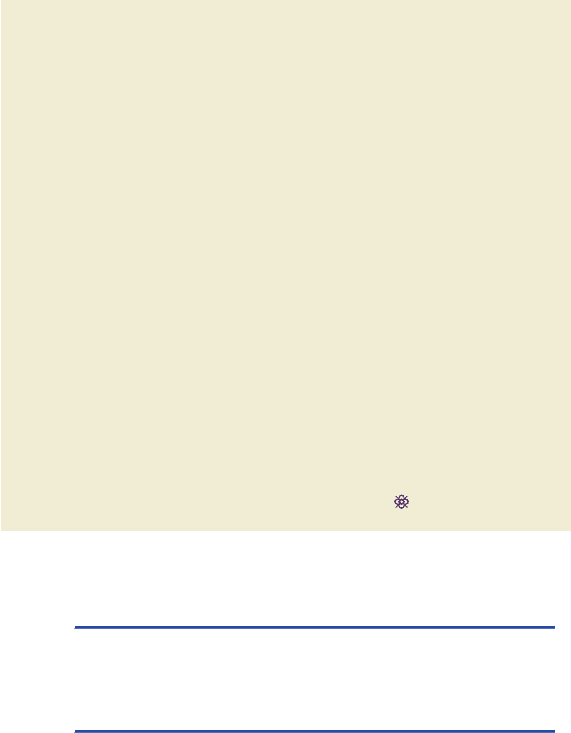
The Postwar Soviet Union
Q
Focus Questions: How did Nikita Khrushchev change
the system that the Soviet dictator Joseph Stalin had
put in place before his death in 1953? To what degree
did his successors continue Khrushchev’s policies?
World War II had left the Soviet Union as one of the
world’s two superpowers and its leader, Joseph Stalin, in a
position of strength. He and his Soviet colleagues were
now in control of a vast empire that included Eastern
Europe, much of the Balkans, and new territory gained
from Japan in East Asia.
From Stalin to Khrushchev
At the same time, World War II had devastated the Soviet
Union. Nearly 30 million citizens lost their lives, and
cities such as Kiev, Kharkov, and Leningrad suffered
enormous physical destruction. As the lands that had
been occupied by the German forces were liberated, the
Soviet government turned its attention to restoring their
economic structures. Nevertheless, in 1945, agricultural
production was only 60 percent and steel output only
50 percent of prewar levels. The Soviet people faced in-
credibly difficult conditions: ill-housed and poorly
clothed, they worked longer hours and ate less they than
before the war.
Stalinism in Action In the immediate postwar years,
the Soviet Union removed goods and materials from
occupied Germany and extorted valuable raw materials
from its satellite states in Eastern Europe (see Map 27.1).
More important, however, to create a new industrial base,
Stalin returned to the method he had used in the 1930s---
the extraction of development capital from Soviet labor.
Working hard for little pay and for precious few con-
sumer goods, Soviet laborers were expected to produce
goods for export with little in return for themselves. The
incoming capital from abroad could then be used to
purchase machinery and Western technology. The loss of
millions of men in the war meant that much of this
tremendous workload fell upon Soviet women, who
performed almost 40 percent of the heavy manual labor.
The pace of economic recovery in the postwar Soviet
Union was impressive. By 1947, industrial production
had attained 1939 levels. New power plants, canals, and
giant factories were built, and industrial enterprises and
oil fields were established in Siberia and Soviet Central
Asia.
Although Stalin’s economic recovery policy was
successful in promoting growth in heavy industry, pri-
marily for the benefit of the military, consumer goods
remained scarce as long-suffering Soviet citizens were still
being asked to suffer for a better tomorrow. Heavy in-
dustry grew at a rate three times that of personal con-
sumption. Moreover, the housing shortage was acute,
with living conditions especially difficult in the over-
crowded cities.
When World War II ended in 1945, Stalin had been
in power for more than fifteen years. Political terror en-
forced by several hundred thousand secret police ensured
that he would remain in power. By the late 1940s, an
estimated nine million Soviet citizens were in Siberian
concentration camps.
Increasingly distrustful of competitors, Stalin ex-
ercised sole authority and pitted his subordinates against
each other. His morbid suspicions extended to even his
closest colleagues, causing his associates to become
completely cowed. As he remarked mockingly on one
occasion, ‘‘When I die, the imperialists will strangle all of
you like a litter of kittens.’’
1
The Rise and Fall of Khrushchev Stalin died---
presumably of natural causes---in 1953 and, after some
bitter infighting within the party leadership, was suc-
ceeded by Georgy Malenkov, a veteran administrator and
ambitious member of the Politburo (the party’s governing
body). But Malenkov’s reform goals did not necessarily
appeal to key groups, including the army, the Communist
Party, the managerial elite, and the security services (now
known as the Committee on Government Security, or
KGB). In 1953, Malenkov was removed from his position
as party leader, and by 1955 power had shifted to his rival,
the new party general secretary, Nikita Khrushchev.
672 CHAPTER 27 BRAVE NEW WORLD: COMMUNISM ON TRIAL
increasingly emboldened to test the waters of the global capitalist
marketplace. In the United States, the newly elected president,
Ronald Reagan, boldly predicted the imminent collapse of the
‘‘evil empire.’’
Within a period of less than three years (1989--1991), the
Soviet Union ceased to exist as a nation. Russia and other former
Soviet republics declared their separate independence, Communist
regimes in Eastern Europe were toppled, and the long-standing divi-
sion of postwar Europe came to an end. Although Communist par-
ties survived the demise of the system and showed signs of renewed
vigor in some countries in the region, their monopoly is gone, and
they must now compete with other parties for power.
The fate of communism in China has been quite different.
Despite some turbulence, communism has survived in China, even
as that nation takes giant strides toward becoming an economic su-
perpower. Yet, as China’s leaders struggle to bring the nation into
the twenty-first century, many of the essential principles of Marxist-
Leninist dogma have been tacitly abandoned.
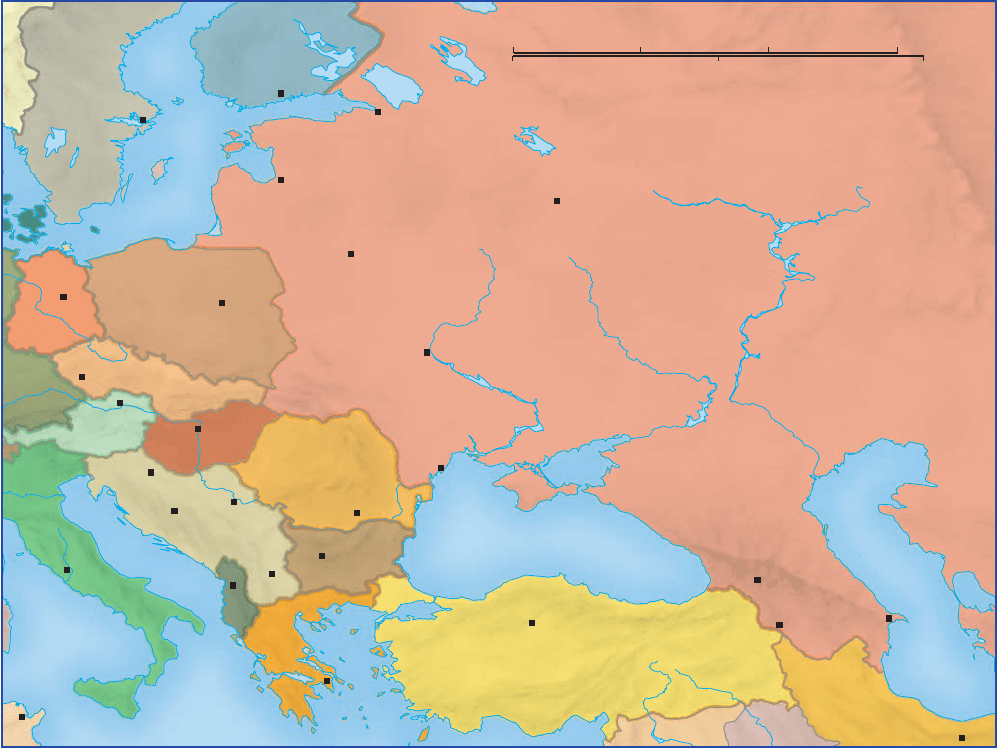
Once in power, Khrushchev moved vigorously to
boost the performance of the Soviet economy and revi-
talize Soviet society. In an attempt to release the stran-
glehold of the central bureaucracy over the national
economy, he abolished dozens of government ministries
and split up the party and government apparatus.
Khrushchev also attempted to rejuvenate the stagnant
agricultural sector. He attempted to spur production by
increasing profit incentives and opened ‘‘virgin lands’’ in
Soviet Kazakhstan to bring thousands of acres of new
land under cultivation.
An innovator by nature, Khrushchev had to over-
come the inherently conservative instincts of the Soviet
bureaucracy, as well as those of the mass o f the Soviet
population. His plan to remove the ‘‘dead hand’’ of the
state, however laudable in intent, aliena ted much of the
Soviet offic ial class, and his effort to split the party
angered t hose who saw it as the central force in the
Soviet system. Kh rushche v’s agricultural schemes in-
spired similar opposition. His effort to persuade Rus-
sians to e at more corn (an idea he had apparently picked
up during a visit to the United States) earned him the
mocking nickname ‘‘Cornman.’’ The industrial growth
rate, which had soared in the early 1950s, now declined
dramatically, from 13 percent in 1953 t o 7.5 percent
in 1964.
Khrushchev was probably best known for his policy
of destalinization. Khrushchev had risen in the party
hierarchy as a Stalin prot
eg
e, but he had been deeply
disturbed by his mentor’s excesses and, once in a position
Bucharest
Tunis
Tehran
Ankara
Athens
Tirana
Belgrade
Sofia
Budapest
Tbilisi
Baku
Yerevan
Warsaw
Prague
Sarajevo
Skopje
Rome
Berlin
Stockholm
Helsinki
Moscow
Minsk
Odessa
Kiev
Vienna
Zagreb
Riga
Leningrad
ITALY
DENMARK
EAST
GERMANY
WEST
GER.
CZECHOSLOVAKIA
AUSTRIA
HUNGARY
ROMANIA
BULGARIA
SWEDEN
FINLAND
ALBANIA
GREECE
TURKEY
UNION OF SOVIET SOCIALIST REPUBLICS
YUGOSLAVIA
IRAN
POLAND
Sicily
Black Sea
D
n
i
e
p
e
r
R
.
V
o
l
g
a
R
.
B
a
l
t
i
c
S
e
a
Caspian Sea
D
a
n
u
b
e
R
.
T
i
g
r
i
s
R
.
E
u
p
h
r
a
t
e
s
D
o
n
R
.
0 500 1,000 Miles
0 500 750 1,500 Kilometers
MAP 27.1 Eastern Europe Under Soviet Rule. After World War II, the boundaries of
Eastern Europe were redrawn as a result of Allied agreements reached at the Tehran and Yalta
conferences. This map shows the new boundaries that were established throughout the region,
placing Soviet power at the center of Europe.
Q
How had the boundaries changed from the prewar era?
THE POSTWAR SOVI ET UNION 673
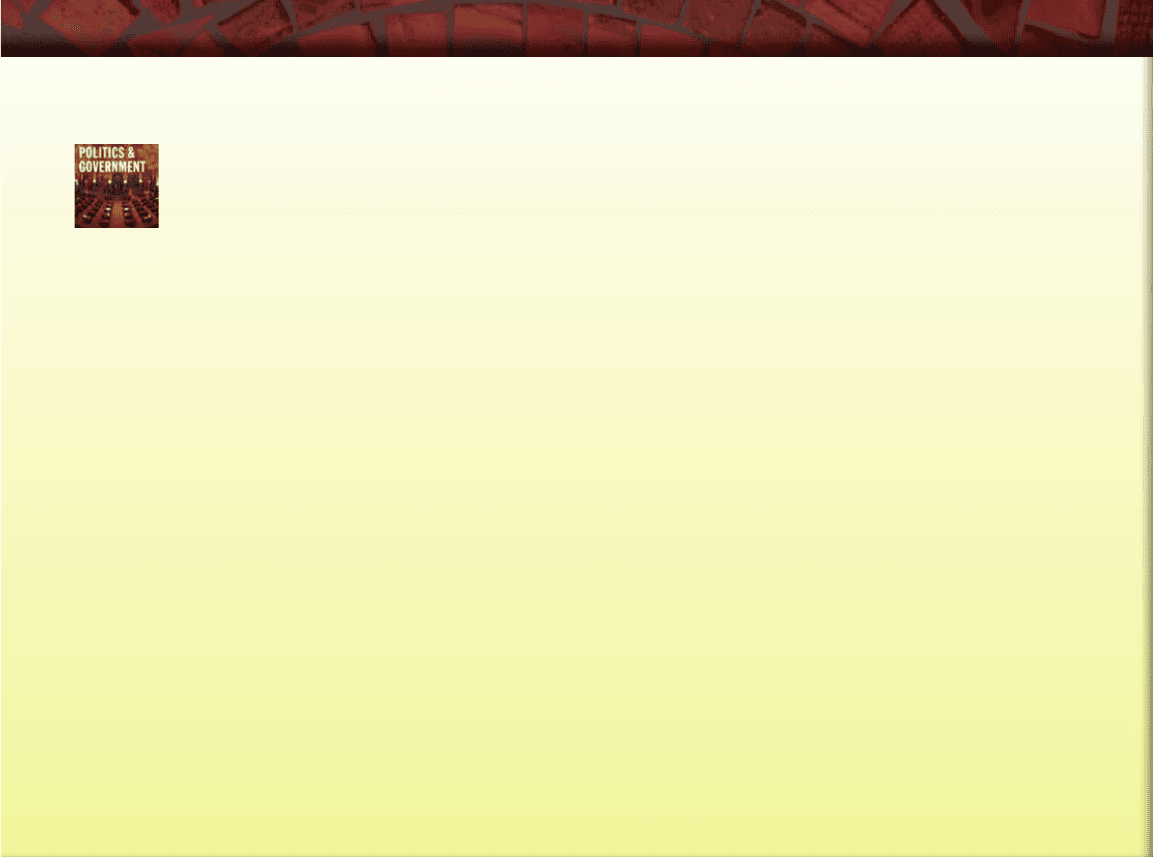
of authority, moved to excise the Stalinist legacy from
Soviet society. The campaign began at the Twentieth
National Congress of the Communist Party in February
1956, when Khrushchev gave a long speech in private
criticizing some of Stalin’s major shortcomings. The
speech had apparently not been intended for public dis-
tribution, but it was quickly leaked to the Western press
and created a sensation throughout the world (see the box
above). Under Khrushchev’s instructions, thousands of
prisoners were released from concentration camps.
Khrushchev’s personality, however, did not endear
him to higher Soviet officials, who frowned at his ten-
dency to crack jokes and play the clown. Foreign policy
failures further damaged Khrushchev’s reputation among
his colleagues (see Chapter 26). While he was away on
vacation in 1964, a special meeting of the Soviet Politburo
voted him out of office (because of ‘‘deteriorating health’’)
and forced him into retirement.
The Brezhnev Years (1964--1982)
The ouster of Nikita Khrushchev in October 1964 vividly
demonstrated the challenges that would be encountered
by any leader sufficiently bold to try to reform the Soviet
system. Leonid Brezhnev (1906--1982), the new party
chief, was undoubtedly aware of these realities of Soviet
politics, and his long tenure in power was marked, above
all, by the desire to avoid changes that might provoke
instability, either at home or abroad. Brezhnev was
himself a product of the Soviet system. He had entered
the ranks of the party leadership under Stalin, and al-
though he was not a particularly avid believer in party
ideology, he was no partisan of reform.
Still, Brezhnev sought stability in the domestic arena.
He and his prime minister, Alexei Kosygin (1904--1980),
undertook what might be described as a program of
‘‘de-Khrushchevization,’’ returning the responsibility for
KHRUSHCHEV DENOUNCES STALIN
Three years after Stalin’s death, the new Soviet
premier, Nikita Khrushchev, addressed the
Twentieth Congress of the Communist Party and
denounced the former Soviet dictator for his
crimes. This denunciation was the beginning of a policy of
destalinization.
Khrushchev Addresses the Twent ieth Party
Congress, February 1956
Comrades, ...quite a lot has been said about the cult of the individ-
ual and about its harmful consequences. ... The cult of the person
of Stalin ...became at a certain specific stage the source of a whole
series of exceedingly serious and grave perversions of Party princi-
ples, of Party democracy, of revolutionary legalit y.
Stalin absolutely did not tolerate collegiality in leadership and
in work and ...practiced brutal violence, not only toward everything
which opposed him, but also toward that which seemed to his ca-
pricious and despotic character, contrary to his concepts.
Stalin abandoned the method of ideological struggle for that of
administrative violence, mass repressions and terror. ... Arbitrary
behavior by one person encouraged and permitted arbitrariness in
others. Mass arrests and deportations of many thousands of people,
execution without trial and without normal investigation created
conditions of insecurity, fear, and even desperation.
Stalin showed in a whole series of cases his intolerance, his bru-
tality, and his abuse of power. ... He often chose the path of repres-
sion and annihilation, not only against actual enemies, but also
against individuals who had not committed any crimes against the
Party and the Soviet government. ...
Many Party, Soviet, and economic activists who were branded
in 1937--8 as ‘‘enemies’’ were actually never enemies, spies, wreckers,
and so on, but were always honest communists; they were only so
stigmatized, and often, no longer able to bear barbaric tortures, they
charged themselves (at the order of the investigative judges-falsifiers)
with all kinds of grave and unlikely crimes.
This was the result of the abuse of power by Stalin, who began
to use mass terror against the Party cadres. ... Stalin put the Party
and the NKVD [the Soviet police agency] up to the use of mass ter-
ror when the exploiting classes had been liquidated in our country
and when there were no serious reasons for the use of extraordinary
mass terror. The terror was directed ...against the honest workers of
the Party and the Soviet state. ...
Stalin was a very distrustful man, sickly, suspicious. ... Every-
where and in everything he saw ‘‘enemies,’’ ‘‘two-facers,’’ and ‘‘spies.’’
Possessing unlimited power, he indulged in great w illfulness and
choked a person morally and physically. A situation was created
where one could not express one’s own will. When Stalin said that
one or another would be arrested, it was necessary to accept on
faith that he was an ‘‘enemy of the people.’’ What proofs were of-
fered? The confession of the arrested. ... How is it possible that a
person confesses to crimes that he had not committed? Only in one
way---because of application of physical methods of pressuring him,
tortures, bringing him to a state of unconsciousness, deprivation of
his judgment, taking away of his human dignity.
Q
What were the key charges that Khrushchev made against
his predecessor? Can it be said that Khrushchev corrected
these problems?
674 CHAPTER 27 BRAVE NEW WORLD: COMMUNISM ON TRIAL
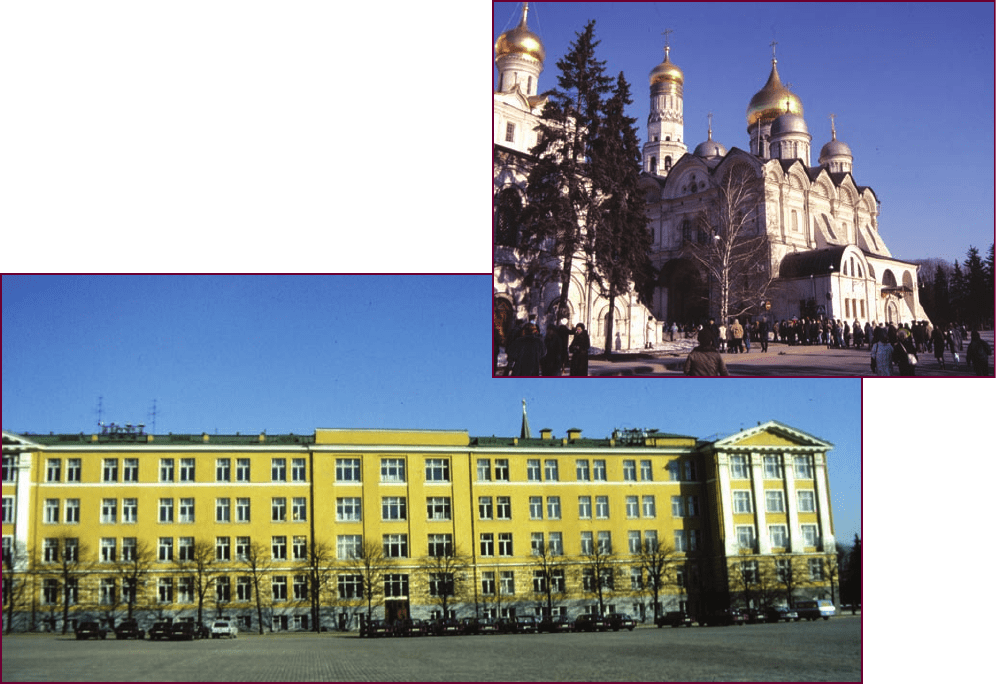
long-term planning to the central ministries and reunit-
ing the Communist Party apparatus. Despite some cau-
tious attempts to stimulate the stagnant farm sector, there
was no effort to revise the basic collective system. In the
industrial sector, the regime launched a series of reforms
designed to give factory managers (themselves employees
of the state) more responsibility for setting prices, wages,
and production quotas. These ‘‘Kosygin reforms’’ had
little effect, however, because they were stubbornly re-
sisted by the bureaucracy.
A Controlled Society Brezhnev also initiated a signif-
icant retreat from Khrushchev’s policy of destalinization.
Criticism of the ‘‘Great Leader’’ had angered con-
servatives both within the party hierarchy and among the
public at large, many of whom still revered Stalin as a
hero and a defender of Russia against Nazi Germany.
Early in Brezhnev’s reign, Stalin’s reputation began to
revive. Although his alleged shortcomings were not to-
tally ignored, he was now described in the official press as
‘‘an outstanding party leader’’ who had been primarily
responsible for the successes achieved by the Soviet
Union.
The regime also adopted a more restrictive policy
toward dissidents in Soviet society. Critics of the Soviet
system, such as the physicist Andrei Sakharov (1921--
1989), were harassed and arrested or, like the famous
writer Alexander Solzhenitsyn, forced to leave the coun-
try. Free expression was also restricted. The media were
controlled by the state and presented only what the state
wanted people to hear. The government made strenuous
efforts to prevent the Soviet people from being exposed to
harmful foreign ideas, especially modern art, literature,
and contemporary Western rock music. When the Sum-
mer Olympic Games were held in Moscow in 1980, Soviet
newspapers advised citizens to keep their children in-
doors to keep them from being polluted with ‘‘bourgeois’’
ideas passed on by foreign visitors.
A Stagnant Economy Soviet leaders also failed to
achieve their objective of revitalizing the national econ-
omy. Whereas growth rates during the early Khrushchev
era had been impressive (prompting Khrushchev during
a reception at the Kremlin in the 1950s to chortle to
an American guest, ‘‘We will bury you,’’ referring to the
United States), under Brezhnev industrial growth
c
William J. Duiker
Behind the Kremlin Walls. A historic walled city in the heart of
Moscow, the Kremlin long served as the home of the tsars during the
imperial era. After the Bolshevik Revolution, it was occupied by Stalin
and his successors. Its physical appearance reflects its varied history, as
forbidding structures like the Communist Party headquarters (below)
were balanced by the fairy-tale domes and cupolas of Russian Orthodox
churches (right)—relics of a faith that came under harsh attacks during
the many decades of Soviet rule.
c
William J. Duiker
THE POSTWAR SOVI ET UNION 675
